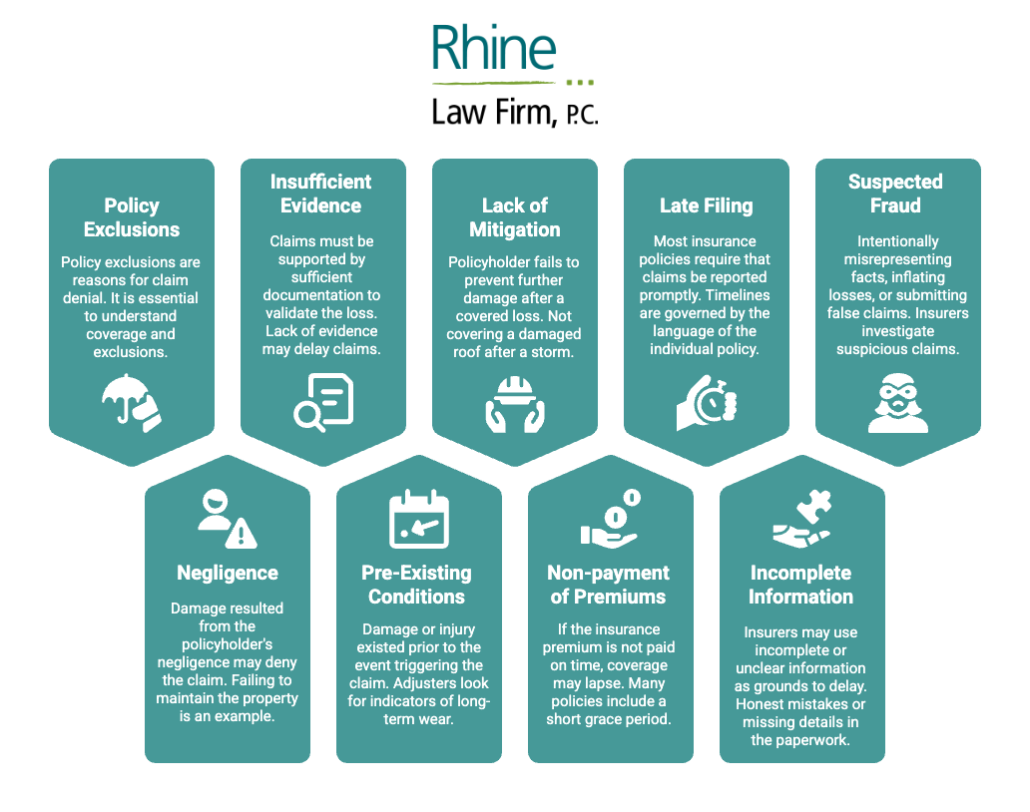
Common Reasons Insurance Claims Are Denied
A natural disaster, such as a hurricane, has upended your life. Not only do you have to cope with property damage, and possible loss of your home, but there is a possibility the insurance company will deny your claim. Common reasons insurance claims are denied run the gamut from incorrectly filed forms to suspected fraud. During this difficult time, fighting with an insurance company over a claim denial is the last thing you need.
Insurance policies are complex documents, often written in technical language that can be difficult for consumers to understand. A property damage lawyer at the Rhine Law Firm can review the reason for denial and negotiate directly with the insurer for a fair resolution. Learn more about the most common reasons insurance claims are denied. Contact us for a free consultation.
Most Common Reasons for Insurance Claim Denial

Policy Exclusions
When purchasing an insurance policy, it’s essential to understand both the coverage and the exclusions. For example, standard homeowners insurance policies generally do not cover flood damage; separate flood insurance must be purchased through the National Flood Insurance Program (NFIP) or a private insurer[rs1] .
The same principle applies to high-value items such as jewelry, fine art, antiques, and collectibles. Most standard policies place limits on coverage for these items, typically capping reimbursement amounts unless the policyholder has added a scheduled personal property endorsement (rider) specifically listing and valuing each item. Without such a rider, coverage for these valuables may be significantly limited or excluded.
Negligence
If an insurance company determines that the damage resulted from the policyholder’s negligence, such as failing to maintain the property or take reasonable precautions, they may deny or reduce the claim, depending on the policy terms. However, if a third party caused the damage, the insurer may still pay the claim but seek reimbursement through subrogation (pursuing the third party for recover).)
Insufficient Evidence to Support the Claim
Every insurance claim must be supported by sufficient documentation to validate the loss. Insurers may deny or delay claims that lack adequate evidence, such as photographs, repair estimates, medical records, or proof of ownership. While photographic evidence is not always legally required, it is highly recommended as it strengthens your case and can expedite the claims process.
Pre-Existing Conditions
Insurance companies may deny claims if they determine that the damage or injury existed prior to the event triggering the claim. In property claims, adjusters often look for indicators of long-term wear, poor maintenance, or previously known issues, which may fall outside policy coverage.
Lack of Damage Mitigation
Most property insurance policies require the policyholder to take “reasonable and necessary” steps to prevent further damage after a covered loss. This duty to mitigate is standard. Failing to act, such as not covering a damaged roof after a storm, can lead to a reduction or denial of the claim for any subsequent damage that could have been avoided.
Non-payment of Premiums
If your insurance premium is not paid on time, your coverage may lapse, and any claims for incidents occurring during that lapse will typically be denied. However, many insurance policies include a short grace period, usually around 10 to 31 days, during which you can make a late payment without losing coverage. The specific terms vary by insurer and policy type, so checking your policy and related documents is important.
Late Filing
In North Carolina, there is no universal statutory deadline for filing an insurance claim; instead, timelines are generally governed by the language of the individual policy. Most insurance policies require that claims be reported “promptly,” “within a reasonable time,” or “as soon as practicable,” often in writing. Courts in North Carolina typically interpret this based on the specific facts of the case, including the reason for the delay.
Incomplete Information
Filing an insurance claim can be overwhelming, especially after a major event like a hurricane. While honest mistakes or missing details in the paperwork are common, insurers may use incomplete or unclear information as grounds to delay or deny a claim.
Suspected Fraud
Insurance fraud, e.g., intentionally misrepresenting facts, inflating losses, or submitting false claims, is a serious issue and a legitimate basis for claim denial. Insurers are legally permitted, and often required, to investigate suspicious claims. They use a combination of claim history reviews, analytics, adjuster evaluations, and sometimes private investigations to detect potential fraud.
Schedule a Free Consultation with the Rhine Law Firm
If your insurance claim has been denied our team of personal injury lawyers at the Rhine Law Firm can help you understand your rights and fight for the coverage you’re entitled to if your damages are significant. Schedule a free, no-obligation consultation today to discuss your case and take the first step toward resolving
About Us
Rhine Law Firm, P.C. serves clients throughout North Carolina and nationwide, specializing in complex civil litigation led by Joel Rhine. With expertise in personal injury, car accidents, property damage, sex abuse, and more, the firm is passionate about taking on challenging cases. They emphasize providing personalized legal representation, prioritizing their clients’ best interests while offering state-of-the-art legal strategies. Rhine Law Firm’s dedicated attorneys enjoy the fight for justice and are committed to guiding clients through complicated legal processes. The firm offers free consultations, flexible appointment scheduling, and Spanish language services.




